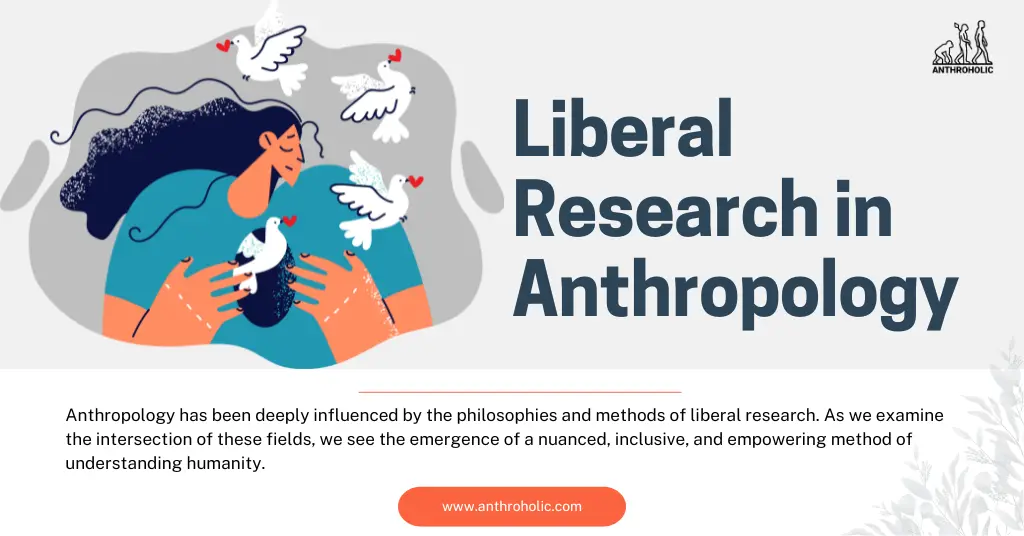AI Answer Evaluation Platform Live Now. Try Free Answer Evaluation Now
Liberal Research and Anthropology
Anthropology has been deeply influenced by the philosophies and methods of liberal research. As we examine the intersection of these fields, we see the emergence of a nuanced, inclusive, and empowering method of understanding humanity.

Defining Liberal Research and Anthropology
- Liberal Research: The term ‘liberal research’ typically refers to research methods rooted in liberal ideologies that place high value on human rights, democracy, and equal opportunities. It promotes independent thinking, free from prejudices and dogmas.
- Anthropology: Anthropology is the scientific study of humans, human behavior and societies, both in the past and present. The subject aims to understand the full sweep and complexity of cultures across all of human history.
Intersecting Values of Liberal Research and Anthropology
Liberal research emphasizes transparency, openness, and participatory methods. This reflects the key tenets of anthropological research.
- Commitment to Human Rights: Both anthropology and liberal research emphasize the respect and understanding of cultural diversity, emphasizing human rights and social justice [1].
- Democratizing Knowledge Production: The participatory methodologies and critical theories often employed in liberal research echo anthropological commitments to empowering the subjects of study and giving voice to the marginalized [2].
- Interdisciplinarity: Both fields draw upon diverse disciplines to build comprehensive understandings of complex human phenomena.
Contributions of Liberal Research to Anthropological Practices
Liberal research methodologies have transformed anthropological practices, both theoretically and practically.
Participatory Ethnography
The participatory nature of liberal research has influenced the practice of ethnography. Liberal research encourages the researcher to engage with their subjects actively, fostering mutual learning and democratizing knowledge production. This has led to the development of participatory ethnography, where anthropologists and community members collaboratively participate in the research process [3].
Advocacy Anthropology
Liberal research’s focus on social justice and human rights has inspired anthropologists to take on more activist roles, giving birth to advocacy anthropology. Here, anthropologists use their research to advocate for the rights and interests of the communities they study [4].
Deconstructive Analyses
Liberal research’s critical approach has influenced anthropologists to challenge traditional societal structures and narratives. This approach, known as deconstructive analyses, uncovers and critiques hidden biases, power relations, and cultural assumptions embedded in societies [5].
Impact and Significance
The amalgamation of liberal research and anthropology has allowed researchers to build holistic and culturally sensitive understandings of societies, which has influenced policy making, community development, and human rights advocacy.
| Impact Areas | Examples |
|---|---|
| Policy making | Informed design of social welfare policies |
| Community Development | Grassroots initiatives and participatory planning |
| Human Rights Advocacy | Advocacy for indigenous rights |
Critical Examination: Liberal Research in Anthropology
Despite its many contributions, the incorporation of liberal research within anthropology isn’t without its critics. Many scholars argue that the liberal lens may risk imposing Western ideals onto non-Western cultures, inadvertently perpetuating the very power imbalances it seeks to address [6].
Ethical Dilemmas
The use of liberal research principles in anthropology raises ethical questions. Some anthropologists argue that advocacy anthropology can compromise their roles as objective observers, potentially leading to biased research [7].
Cross-cultural Misinterpretations
While liberal research emphasizes respect for cultural diversity, its underlying Western philosophies can lead to misunderstandings or oversimplifications of non-Western cultures. In the worst cases, it might contribute to a form of intellectual colonialism [8].
The Future of Liberal Research in Anthropology
Notwithstanding the critiques, the future of liberal research in anthropology seems promising. As global interconnectedness increases, the need for understanding cultures in a more egalitarian manner continues to grow. By continuously refining its methods and philosophies, liberal research in anthropology can address its critics while strengthening its contributions.
A Global Perspective
As the world becomes more interconnected, anthropologists will increasingly need to understand cultures from a global perspective. The principles of liberal research will continue to guide anthropologists in ethically and respectfully interpreting different cultures [9].
Cultural Relativism and Universality
The debate between cultural relativism (the belief that cultural norms and values are relative to their social context) and universality (the belief in universal human rights transcending cultural differences) is central to anthropology. Liberal research, with its commitment to human rights and cultural sensitivity, offers a pathway to navigate this complex terrain [10].
Adaptation and Evolution
Like all academic disciplines, liberal research in anthropology is subject to evolution and adaptation. By acknowledging its limitations and learning from its critics, the field can continue to refine its methods to minimize potential biases and misinterpretations.
Conclusion
Incorporating liberal research in anthropology has amplified the scope and impact of anthropological studies. By acknowledging the pluralities and complexities of human societies, this intersection gives birth to a more compassionate, inclusive, and democratic way of understanding and engaging with our world.
References
[1] Goodale, M. (2009). “Human rights: An anthropological reader.” Wiley-Blackwell
[2] Reason, P. & Bradbury, H. (2001). “Handbook of action research: Participative inquiry and practice.” Sage
[3] Cammarota, J. & Fine, M. (2008). “Revolutionizing Education: Youth Participatory Action Research in Motion.” Routledge
[4] Hale, C.R. (2006). “Activist research v. cultural critique: Indigenous land rights and the contradictions of politically engaged anthropology.” Cultural Anthropology
[5] Derrida, J. (1978). “Writing and Difference.” University of Chicago Press
[6] Escobar, A. (1995). “Encountering development: The making and unmaking of the Third World.” Princeton University Press
[7] Fluehr-Lobban, C. (1991). “Ethics and the Profession of Anthropology: Dialogue for Ethically Conscious Practice.” University of Pennsylvania Press.
[8] Smith, L.T. (2012). “Decolonizing Methodologies: Research and Indigenous Peoples.” Zed Books.
[9] Appadurai, A. (1996). “Modernity at Large: Cultural Dimensions of Globalization.” University of Minnesota Press.
[10] Donnelly, J. (1984). “Cultural Relativism and Universal Human Rights.” Human Rights Quarterly.




